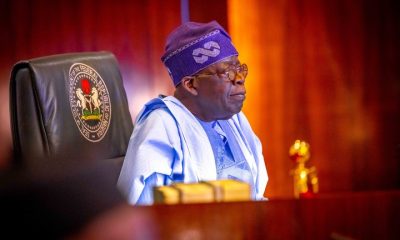National
Nigeria @63:Jonathan commends Nigerians loyalty to nation

Former President Goodluck Jonathan has commended Nigerians for their loyalty to the country, in the face of the modest successes and developmental challenges the nation has faced since independence.
Jonathan said this in a statement by his Media Special Adviser, Mr Ikechukwu Eze on in Abuja.
“It is now 63 years since our dear country got her independence from Britain.
“This commemoration offers us the opportunity to reflect on Nigeria’s great journey of nationhood; acclaim our modest strides, reassess the odds we survived, chart a path out of present challenges and renew our hopes for a greater tomorrow.
“Our country has seen progress as well as setbacks. Patriotic Nigerians, believing in their country, have always stood firm, sharing in the glory of successes and feeling the pain of missed opportunities,” Jonathan said.
He said that if there was a sense of disappointment among the population, especially youths, on the nation’s failed aspirations, over the years, such feeling was not entirely out of place.
“Yet, rather than despair, we should look back at the encouraging signposts that set the tone for an auspicious future and the promise that we could attain our growth and development goals.
“Our nation survived a civil war, pulled through economic downturns at different times and has continued to hold its ground against threatening socio-political challenges, leveraging that indomitable spirit that guided our nationalists to remain steadfast and focused.
“This is the same disposition that today strengthens our citizens and enlivens their spirit and hope against the menace of terrorism, insecurity, economic hardship and worsening effects of climate change,” Jonathan said.
He added that it was the spirit that pushed Nigerians to excel on the global stage in sports, medicine, music, arts, technology and scholarship.
“As we mark yet another independence anniversary, we should focus our energy towards enthroning equity, justice, peace.
“Towards enthroning national cohesion in order to bring to fruition the dream of Nigeria realising its full potential and holding up the torch of liberty and progress for all Africans. Happy Independence Anniversary. God bless Nigeria,” Jonathan said.
Headline
EFCC bars dollar transactions, orders embassies to charge in naira

The Economic and Financial Crimes Commission has barred foreign missions based in Nigeria from transacting in foreign currencies and mandated them to use Naira in their financial businesses.
The EFCC has also mandated Nigerian foreign missions domiciled abroad to accept Naira in their financial businesses.
The anti-graft agency said the move is to tackle the dollarisation of the Nigerian economy and the degradation of the naira
The Commission, therefore, asked the government to stop foreign missions in Nigeria from charging visa and other consular services in foreign denominations.
The EFCC gave the advisory in a letter to the Minister of Foreign Affairs, Amb. Yusuf Tuggar, for onward transmission to all foreign missions in the country.
In the letter, the EFCC said it issued the advisory because the practice of paying for consular services in dollars was in conflict with extant laws and financial regulations in Nigeria.
In a letter dated April 5, 2024, which was addressed to the Minister of Foreign Affairs, Ambassador Yusuf Tuggar, titled: “EFCC Advisory to Foreign Missions against Invoicing in US Dollar,” the EFCC Chairman, Ola Olukoyede expressed dismay over the invoicing of consular services in Nigeria by foreign missions in dollars.
The EFCC cited Section 20(1) of the Central Bank of Nigeria Act, 2007, which makes currencies issued by the apex bank the only legal tender in Nigeria.
The letter read, “I present to you the compliments of the Economic and Financial Crimes Commission, and wish to notify you about the commission’s observation, with dismay, regarding the unhealthy practice by some foreign missions to invoice consular services to Nigerians and other foreign nationals in the country in United States dollar ($).
“It states that ‘the currency notes issued by the Bank shall be the legal tender in Nigeria on their face value for the payment of any amount’.
“This presupposes that any transaction in currencies other than the naira anywhere in Nigeria contravenes the law and is, therefore, illegal.”
The commission further stated that the rejection of the naira for consular services in Nigeria by certain missions, along with non-compliance with foreign exchange regulations in determining service costs, is not just unlawful but also undermines the nation’s sovereignty embodied in its official currency.
The letter continues: “This trend can no longer be tolerated, especially in a volatile economic environment where the country’s macroeconomic policies are constantly under attack by all manner of state and non-state actors.
“In light of the above, you may wish to convey the commission’s displeasure to all missions in Nigeria and restate Nigeria’s desire for their operations not to conflict with extant laws and regulations in the country.”
Diplomatic sources said yesterday, May 10, that some embassies were wondering whether the EFCC’s advisory represented the position of the Federal Government.
Headline
Suspend cybersecurity levy– Reps to CBN

The House of Representatives on Thursday asked the Central Bank of Nigeria to withdraw the circular directing all banks to commence charging a 0.5 per cent cybersecurity levy on all electronic transactions within the country, The Nation reports.
The motion on the urgent need to halt and modify the implementation of the cybersecurity levy was moved by the member representing the Obio/Akpor Constituency, Kingsley Chinda.
The House urged the CBN to withdraw the circular and “issue a more understandable one,” as Chinda had drawn the attention of the House to multiple interpretations of the CBN directive against the specifications in the Cybersecurity Act.
-

 Headline5 days ago
Headline5 days agoSuspend cybersecurity levy– Reps to CBN
-

 Business5 days ago
Business5 days agoNigeria needs over $2bn to revive Ajaokuta Steel Plant, says Minister
-

 Headline3 days ago
Headline3 days agoPrince Harry visits sick Nigerian soldiers in Kaduna
-

 Entertainment3 days ago
Entertainment3 days agoAMVCA Cultural Day: BBNaija’s Neo, Venita win Best Dressed Male, Female
-

 Headline5 days ago
Headline5 days agoTinubu resumes work after foreign trip
-

 News5 days ago
News5 days agoShan George’s money returned to Zenith Bank account
-

 Metro3 days ago
Metro3 days agoEx-Sports Minister laments after hospital neglected him for hours over N80000 deposit







